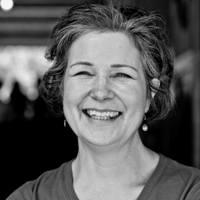
“The middle of the road is all of the usable surface. The extremes, right and left, are in the gutters.” ~ Dwight D. Eisenhower
One of the most profound truths I’ve learned on my journey of personal growth is that wisdom is usually not found in the extremes, but somewhere in the middle.
Unfortunately, I’ve also learned that my pattern is usually to swing from one end of the spectrum to the other, before gradually settling into that wise middle way.
I recently received another lesson on this topic while sitting (appropriately enough) on the familiar couch across from my long-time therapist. I was proudly telling her how much more together I was feeling now that I’m a few of years out from an unpleasant divorce.
I had finally realized that I didn’t need a relationship to make me happy: I was really enjoying my single life and didn’t need a man in order to feel good about myself. My brilliant therapist congratulated me on that, and then asked, “But what do you want?”
That question actually stopped me in my tracks. I was doing it again!
For so much of my life, I had felt that I needed things to be a certain way in order for me to be happy. In learning that that wasn’t true, I had unconsciously swung to the opposite end of the spectrum and denied that I had any preferences at all.
As my dear therapist pointed out, there’s a profound difference between wanting and needing, even though sometimes they can feel only a hair’s breadth apart. And wanting is important. It is what says—to yourself and to others and to life—“I am important and I am worthy enough to ask for what I want, even though I might not get it. And that’s okay.”
This realization reminded me of a “clearing” process for disagreements I once learned in a group workshop. At the end of the process, the party with the grievance had the opportunity to make a request of the other, phrased in a specific way:
“Knowing that I might not get it, what I would like from you is…”
In relationships, as in life, it’s crucial to ask for what you really want—as long as you’re prepared for the answer to be “no.” Otherwise you are back on the other end of the spectrum, insisting that certain conditions be met for you to be okay with the person or situation. Psychologist Dr. David Schnarch calls this emotional fusion: we depend on the other person to meet our (perceived) needs, and thus make us happy. Our “requests” are really thinly veiled demands.
But the opposite of this behavior—pretending that we have no wants—will also eventually backfire. A pattern of denying what we truly want can lead to a range of unpleasant consequences, from illness to depression to the so-called “exploding doormat” phenomenon. A life without wants may be less complicated in the short run (and even seem more mature), but it is also flat and devoid of flavor.
Walking that fine line between wanting and needing is what the process of differentiation (described in Schnarch’s book, Passionate Marriage) is all about. Differentiation requires that we both honor our own desires enough to ask for what we want, and take responsibility for our own feelings.
We might be disappointed by the reply or the result we receive. That’s what makes it scary to ask—even if the “asking” is just admitting to yourself that, “Yes, I really do want to be in a relationship.” Sometimes it feels safer and less painful to not even go there in your mind, which is what I was really doing when I thought I was being so spiritually advanced.
If we ask for what we want, and the answer is “no,” we might have to make changes or adjust our expectations. Being a grown-up, being a differentiated person, means acknowledging that we won’t always get what we want, but it’s still okay to want it. It takes real courage to walk the line, to go right up to the edge of wanting without ever stepping over the edge into needing.
It’s a skill that we will all use over and over again in life, growing our muscles each time. Luckily, there are some clear signs that can let us know if we’ve crossed the line:
1. Your life (or a part of your life) feels like it’s “on hold” while you wait for a certain outcome. This used to happen to me on a regular basis as I waited for all of the conditions I thought I needed in order to be happy (relationships, jobs, more money, and so on).
2. You feel angry or upset that someone is not doing what you think they should. Those feelings aren’t wrong—they’re just an indication that you’re depending on someone else’s actions for your own happiness. You “need” them to change for you to be okay.
In both cases, the real issue is control. Unfortunately, we are usually not in control of what happens to us or what other people choose to do. We are, however, 100 percent in control of how we react to those things. This includes our feelings as well as our actions. It might seem that you have no choice but to feel upset by certain things, but that is actually not the truth.
Again, we aren’t “bad” for being upset, but we can choose the degree of suffering we let ourselves feel. Doing that allows us to practice what Dr. Schnarch calls self-soothing. But for many of us, relationships become a practice in handing our emotions over to our partners—essentially saying, “Here, you take care of these—they’re your responsibility.” And in turn, we take responsibility for our partner’s feelings, which is no picnic.
Walking that fine middle line between wanting and needing definitely calls for self-soothing. But staying on either end of the spectrum—whether that means denying our wants or crossing the line into needing—is far more painful in the long run.
For me, I have had to come to terms with the fact that, although I want to be in a relationship again, I am currently not. Beyond the obvious, I have little control over when or if it will happen. But because I don’t need a relationship, I can still be happy with my life as it is. And it’s my responsibility to own both this desire and any disappointment or sadness I might feel if it’s not fulfilled.
For now, I will just keep walking that middle line, learning to use the skills of differentiation to keep my balance.
~
~
Author: Amaya Pryce
Image: Bill Trammel/Flickr
Editor: Nicole Cameron
Copy Editor: Callie Rushton







Read 3 comments and reply